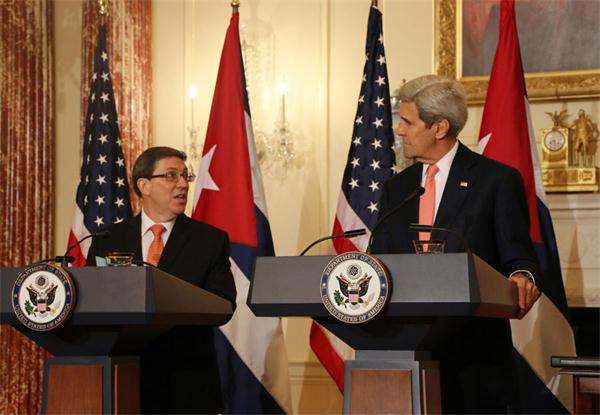US-Cuba relations still face many challenges
Updated: 2015-08-15 08:18
By Yang Jianmin(China Daily)
|
||||||||
 |
|
US Secretary of State John Kerry (right) and visiting Cuban Foreign Minister Bruno Rodriguez speak to reporters on Monday afternoon at a joint press conference held at the US State Department in Washington, where the two just concluded their talks. Rodriguez has urged the US to lift its blockade on Cuba and return the US naval base in Guantanamo Bay to Cuba. Kerry has described the economic and trade embargo on Cuba as not working but said the US at the moment has no intention to return Guantanamo. Chen Weihua/China Daily |
The United States and Cuba reopened their embassies in each other's capitals on July 20 after 54 years, marking the official restoration of their diplomatic ties. The diplomatic rapprochement began with a milestone meeting between US President Barack Obama and Cuban President Raul Castro on Dec 17, 2014, but full normalization of US-Cuba ties is unlikely to happen any time soon.
The process of fully normalizing bilateral relations will face tougher challenges from all directions and will depend on the length to which the two sides can go to realize it. If they succeed, it will make a world of difference to them as well as US-Latin America ties.
To begin with, Washington and Havana are yet to agree on how to fully normalize overall ties - Cuba believes they have completed only the first stage. Therefore, they still have a long way to go to deal with historical issues, including the US' not-so-successful isolation policy and trade restrictions on Cuba, and the dispute over the return to Cuba of Guantanamo Bay, which now serves as a US naval base and houses a notorious detention center.
Futile as it has proved, the US' attempt to instigate political change in Cuba through sanctions has been legislated by the US Congress, which therefore has a bigger say in deciding Washington's policy toward Havana. In other words, the US president cannot lift the ban by issuing an order if the Congress does not agree. Also, the routine changes in the federal government could thwart the full normalization of their ties.
The two countries' social and economic systems are their greatest difference. And the US will start lifting its trade embargo only if the Cuban government agrees to carry out "democratic reforms" and embrace free market economy. This US condition may not change in spite of the resumption of diplomatic ties, and Cuba is most likely to reject it.
One thing seems certain, though: Obama has made a wise move by restoring US-Cuba diplomatic ties, because it could be a political game-changer. By restoring diplomatic ties with Cuba, Obama might have helped his Democratic Party win more Cuban Americans' support in the 2016 presidential election. Also, he has fulfilled an increasing number of US citizens' demand for restoring ties with Cuba.
Washington's efforts to isolate Havana were a failure. In fact, they ended up isolating the US from most UN members, especially from Latin America. The US-sponsored Free Trade Area of the Americas - which excluded Cuba - was declared dead in 2005 after 15 years because of the opposition of most Latin American countries.
To protect its extensive security and political interests in Latin America, the US has to reboot its relations with the region.
Of course, the US and Cuba will benefit more than other countries from the restoration of diplomatic ties, because it will help the latter create a healthy environment for foreign investment and economic reform and, as a major exporter of agricultural products, the former is capable of fulfilling Cuba's annual food demand worth more than $2 billion.
The author is an expert with the Center for Cuban Studies at the Institution of Latin American Studies, Chinese Academy of Social Sciences.
- Global health entering new era: WHO chief
- Brazil's planning minister steps aside after recordings revelation
- Vietnam, US adopt joint statement on advancing comprehensive partnership
- European border closures 'inhumane': UN refugee agency
- Japan's foreign minister calls A-bombings extremely regrettable
- Fukushima impact unprecedented for oceans: US expert

 Stars of Lijiang River: Elderly brothers with white beards
Stars of Lijiang River: Elderly brothers with white beards
 Wealthy Chinese children paying money to learn British manners
Wealthy Chinese children paying money to learn British manners
 Military-style wedding: Fighter jets, grooms in dashing uniforms
Military-style wedding: Fighter jets, grooms in dashing uniforms
 Striking photos around the world: May 16 - May 22
Striking photos around the world: May 16 - May 22
 Robots help elderly in nursing home in east China
Robots help elderly in nursing home in east China
 Hanging in the air: Chongqing holds rescue drill
Hanging in the air: Chongqing holds rescue drill
 2.1-ton tofu finishes in two hours in central China
2.1-ton tofu finishes in two hours in central China
 Six things you may not know about Grain Buds
Six things you may not know about Grain Buds
Most Viewed
Editor's Picks

|

|

|

|

|

|
Today's Top News
Liang avoids jail in shooting death
China's finance minister addresses ratings downgrade
Duke alumni visit Chinese Embassy
Marriott unlikely to top Anbang offer for Starwood: Observers
Chinese biopharma debuts on Nasdaq
What ends Jeb Bush's White House hopes
Investigation for Nicolas's campaign
Will US-ASEAN meeting be good for region?
US Weekly

|

|







